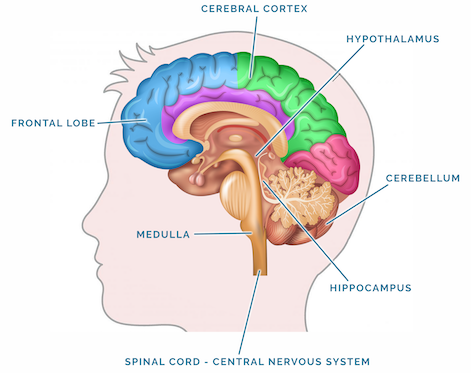The Developing Teen Brain
As our youth navigate high school through young adulthood, underage drinking increases dramatically. In the Massapequas, some youth report having their first drink before the age of fifteen.* Children who begin drinking by age 13 have a 38 percent higher risk of developing alcohol dependence later in life (National Institute on Alcohol Abuse and Alcoholism [NIAAA]).
*New York Partnership for Success Student Survey: Massapequa Union Free School District (Grades 7-12)
The Brain

Adolescence is a crucial period for young people, as their brains continue to develop until around the age of twenty-five.
Alcohol and drugs can impact the natural development of the brain.
Research shows that during adolescence, when the brain is undergoing significant changes, young people may be more sensitive to the effects of drugs (Nora D. Volkow, M.D., NIDA).
When children start using alcohol or drugs before the age of fifteen, it can increase the likelihood of developing substance use challenges later in life (NIDA).
Cerebral Cortex
Alcohol can affect how the brain processes information from the senses, particularly in the cerebral cortex. This can influence thought processes and decision-making, sometimes leading to less cautious judgments. It also lowers inhibitions, which can make people feel more talkative and confident. Alcohol can dull the senses and raise the pain threshold, and as blood alcohol content (BAC) increases, these effects may become more noticeable.
Spinal Cord - Central Nervous System
When we think about doing something, the central nervous system—the brain and spinal cord—sends signals to the relevant parts of the body. Alcohol can slow down the central nervous system, which may result in slower thinking, speaking, and movement.
Frontal Lobe
The frontal lobes of the brain are responsible for planning, decision-making, and self-control. When alcohol affects the frontal lobes, it may be harder to regulate emotions and impulses, which can lead to actions without much thought. Long-term alcohol use may impact the functioning of the frontal lobes over time.
Hippocampus
The hippocampus plays a key role in forming memories. When alcohol affects the hippocampus, it can temporarily impair memory, making it harder to recall recent information, such as a name or phone number, even after just a couple of drinks. Prolonged alcohol use can make it more challenging to learn and retain new information.
Cerebellum
The cerebellum helps with coordination and awareness. Alcohol can impact these skills, causing shakiness or difficulty with balance, which can affect tasks like walking or driving.
Hypothalmus
The hypothalamus regulates many important bodily functions, such as hunger, thirst, blood pressure, and body temperature. Alcohol can influence these processes, leading to changes like increased thirst, hunger, or urination, along with a decrease in body temperature and heart rate.
Medulla
The medulla controls automatic functions like heartbeat and body temperature. Alcohol can lower body temperature, and excessive consumption may interfere with these vital functions. In extreme cases, it can be dangerous to overall health.
Alcohol and Health >>
Underage Drinking and The Law >>